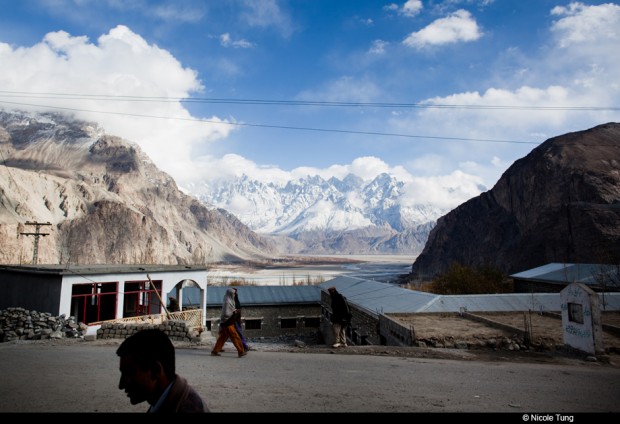Notes
Nicole Tung: Gilgit Election
Nicole Tung is an American photographer who traveled to Pakistan overland from China in November to document the internally-displaced people from the Pakistani Army’s counter-insurgency in the Swat valley and South Waziristan. But before she could do so, she and her translator were detained by the police for eight days near the Afghan border. This is the second of three posts of her photographs and experiences.
Gilgit-Baltistan in northern Pakistan, formerly known as the Northern Areas, gained its autonomous status in September of last year, which set in motion overdue reforms as well as its own political process. The first ever election for Giglit-Baltistan’s Legislative Assembly was scheduled for November 12, and I arrived a few days before, via the Karakoram Highway from western China after three days on the road. The bus I took lurched through the Pamir and Karakoram mountain ranges, which are extensions of the Hindu Kush, revealing stunning landscapes and the homes of myriad ethnic Central Asian peoples along the way.
In the town of Karimabad, located in the Hunza Valley at an altitude of over 8,000 feet, local activists campaigned for their respective political parties: the ruling Pakistan People’s Party (PPP), party of the late Benazir Bhutto, the Muttahida Qaumi Movement (MQM), whose main base is in the financial capital, Karachi, the Pakistan Muslim League Nawaz Sharif (PML-N), and Pakistan Muslim Leage Quaid-e-Azam (PML-Q).
With towering mountain peaks as their backdrop, young MQM party supporters shouted slogans into megaphones sending echoes across the valley. They sat atop white vans waving flags while men on motorbikes honked their horns. The PPP did just the same and also met late into the evenings. Traditionally the favored party of the area and the region, the PPP went on to win the most seats for the Legislative Assembly.
Soon after the elections began, there were reports of minor clashes between supporters of opposing parties angered by rumors of vote rigging. Everything seemed calm for the most part up in the Hunza valley. Surely enough though, when I arrived two days later in Gilgit on November 14, tires burned in the streets as dissatisfaction amongst the opposition played out publicly. Members of the various parties vented their anger by blocking off whole sections of the town, forcing shops to close and leaving a dark smoky cloud over the gathering crowds. Dozens were wounded and two people were killed, according to the national media.
The reaction to this election might not seem so unusual for a society at war, hardly an open democracy. A recount was demanded. When viewed in a larger context, though, this teetering towards aggression and violence over a minor election is a microcosm for where the country stands as a whole. If even the simplest voting can trigger such a fatal backlash; then it is hard to deny that whole regions find it progressively more difficult to buffer the conflicts that are eating Pakistan from the inside out.
–Nicole Tung
PHOTOGRAPHS by NICOLE TUNG
caption of color image: Village of Khaplu, eight hours by road east of Gilgit, near the disputed Kashmir border. Gilgit-Baltistan (Northern Areas)



Reactions